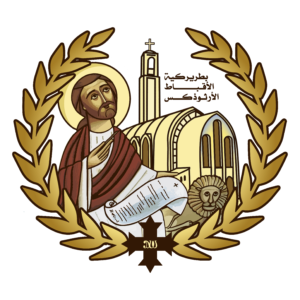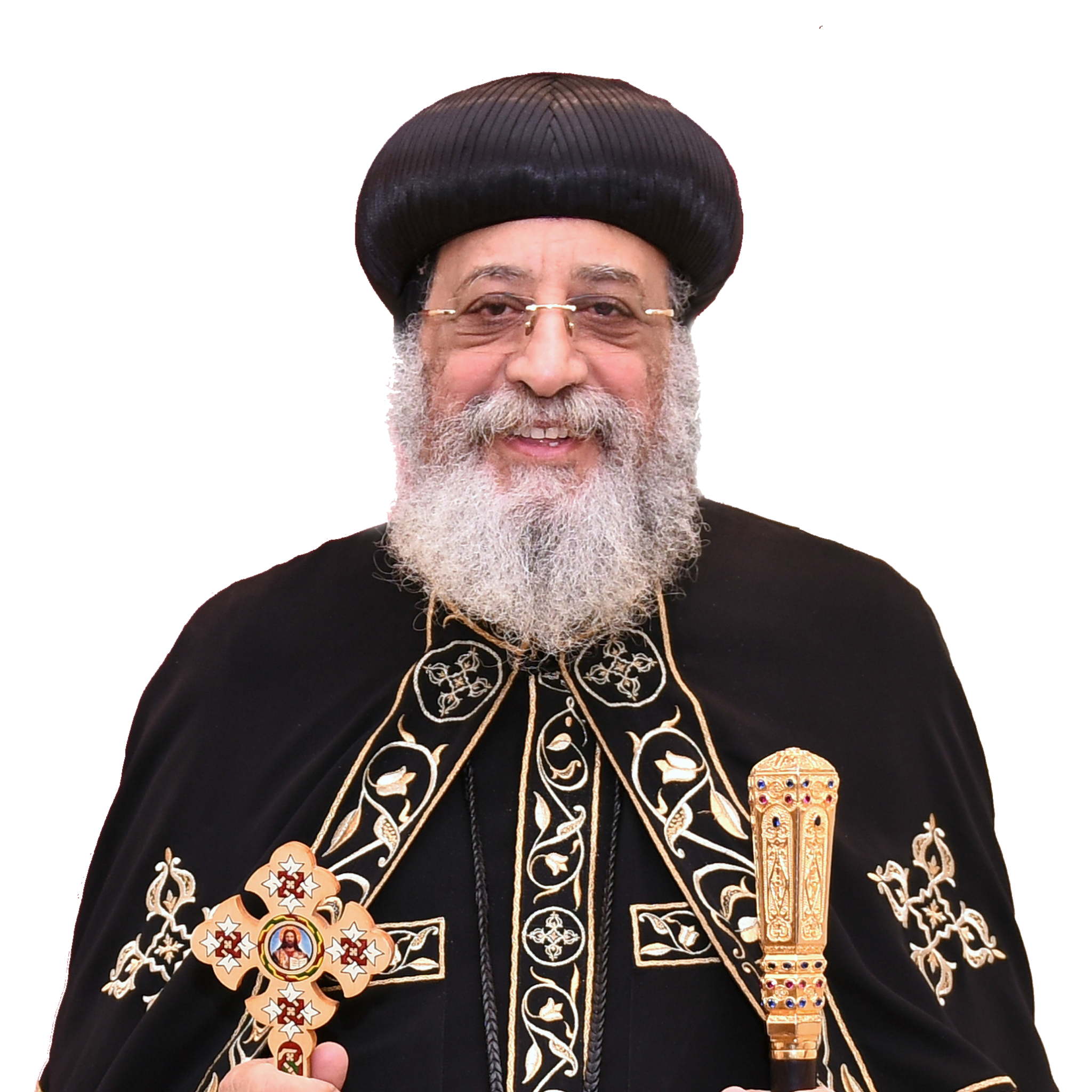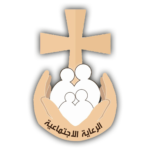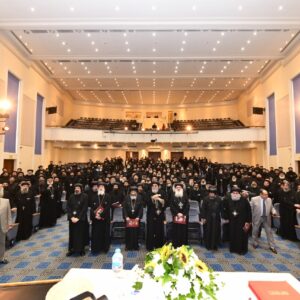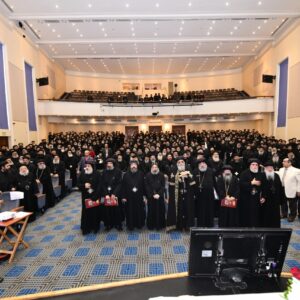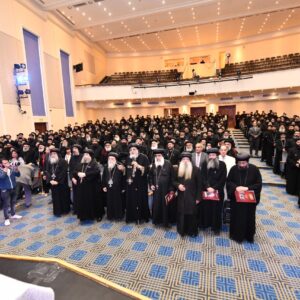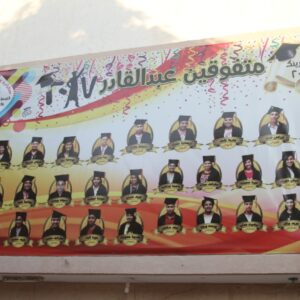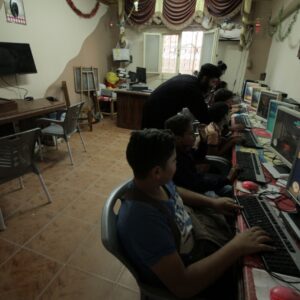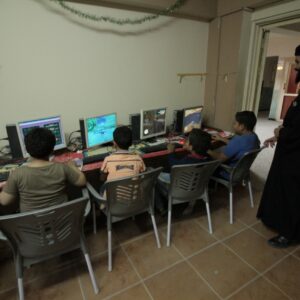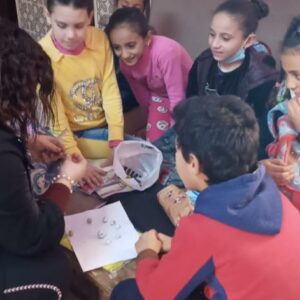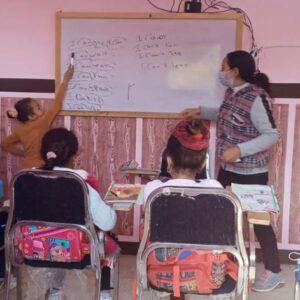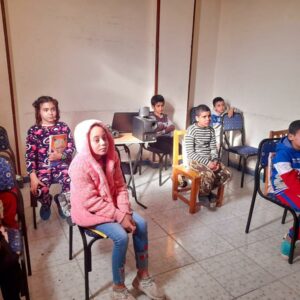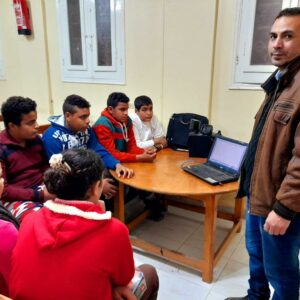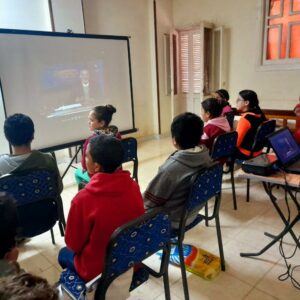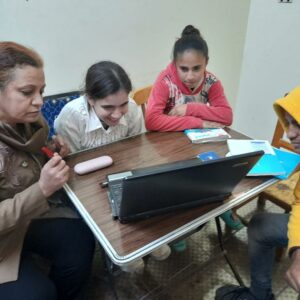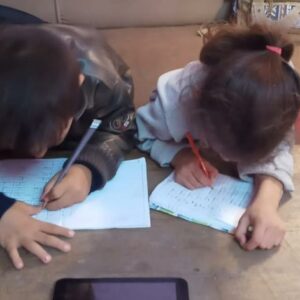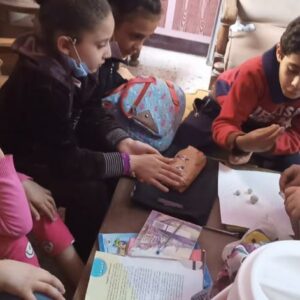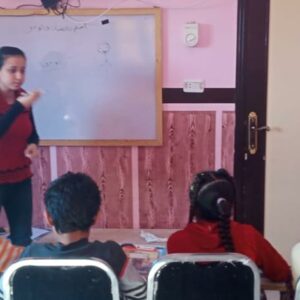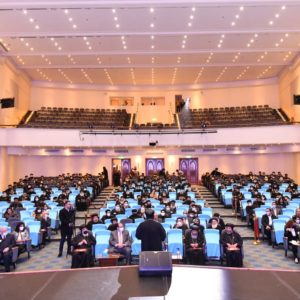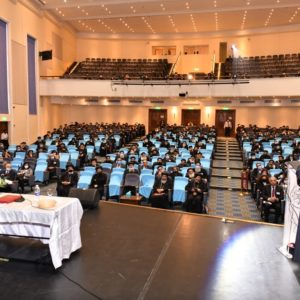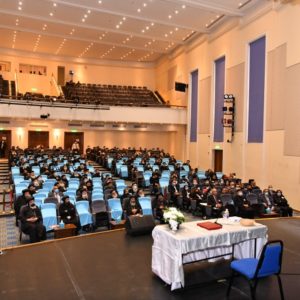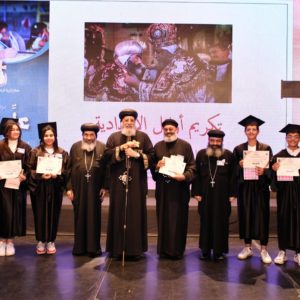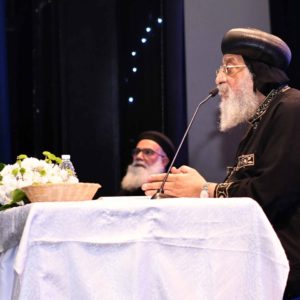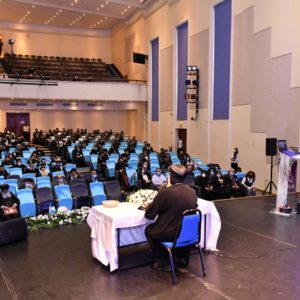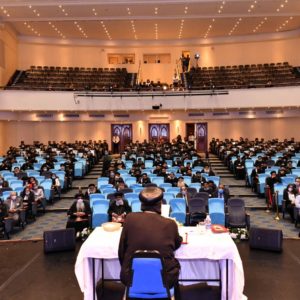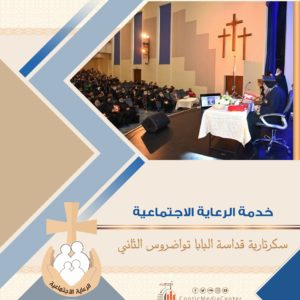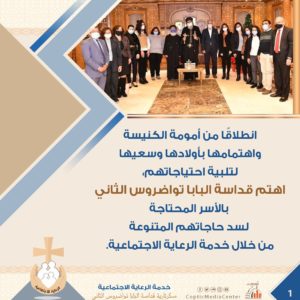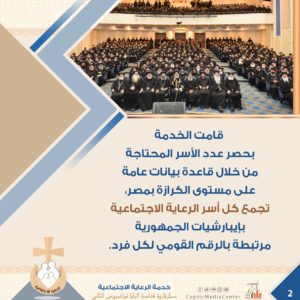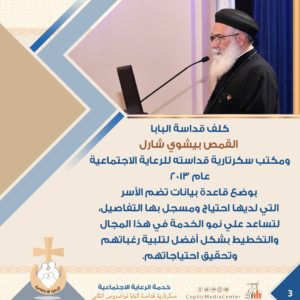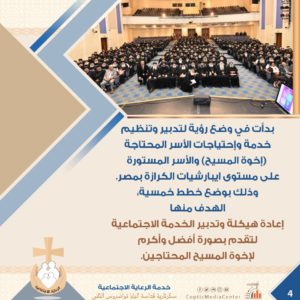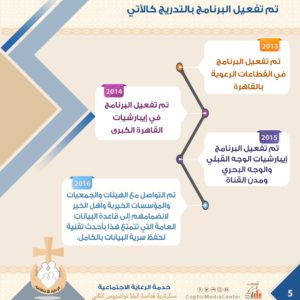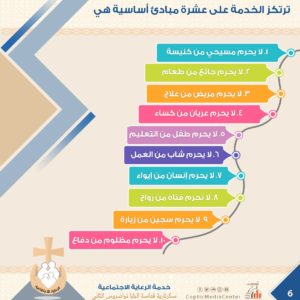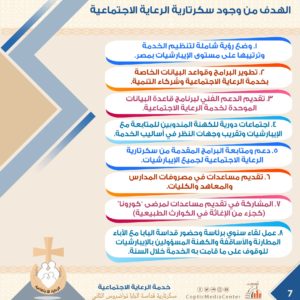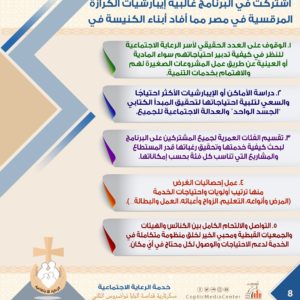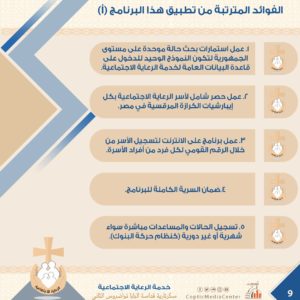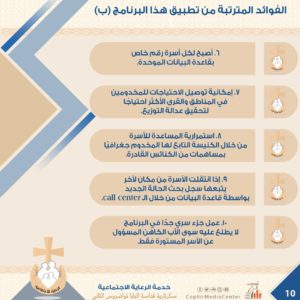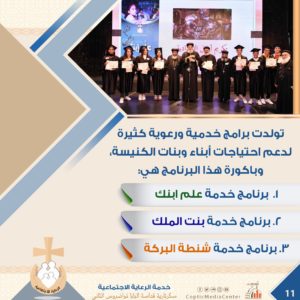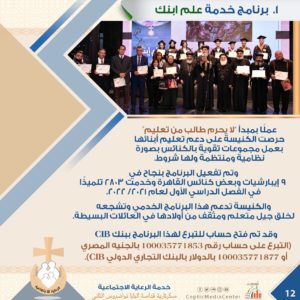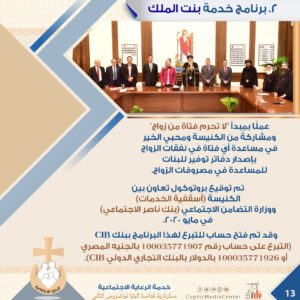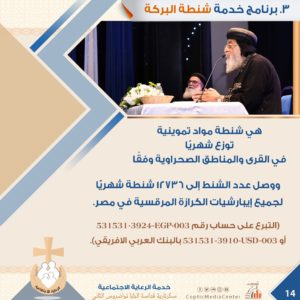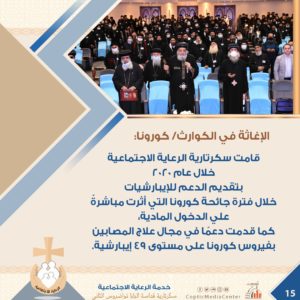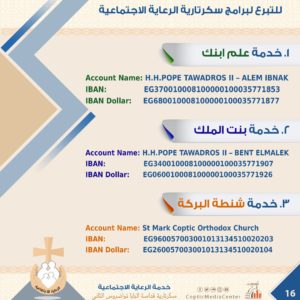The Church is a mother who cares for all her children and seeks to meet their needs. Therefore, His Holiness Pope Tawadros II has focused on determining the number of families in need through a comprehensive database for the Church in Egypt that includes all families that need social care in all the dioceses. The index key for that database is the person’s unique national ID number that is found on all birth certificates. Thus, all persons’ records are unique and not repeated.
H.H. Pope Tawadros II commissioned Hegumen Fr. Bishoy Sharl and His Holiness’s secretariat for the Office of Social Care to develop a database that includes the younger brethren of the Lord name and details to help the growth of this service and to plan better to satisfy their needs.
The service of the Social Care Secretariat focuses in the following basic principles:
- Do not deprive a Christian from being in a church
- Do not deprive a person from food
- Do not deprive a sick person from being treated
- Do not deprive a naked person from clothing
- Do not deprive a child from education
- Do not deprive a youth from a job
- Do not deprive a person from having shelter
- Do not deprive a girl from getting married
- Do not deprive a prisoner from being visited
- Do not deprive an oppressed person from having a defense
The goals of having the Social Care Secretariat:
- Establishing a comprehensive vision for organizing the service at the diocese level in all Egypt
- Developing programs and databases of the social care service and development partners
- Providing technical support for the unified database of the social care service
- Holding periodic meetings for the delegated priests to follow up with dioceses and to converge perspectives of methods of serving
- Supporting and following up with dioceses concerning the programs offered by the Social Care Secretariat
- Aiding in paying tuitions for schools, institutes, and colleges
- Considering, financing, and following up on small businesses
- Participating in providing aid to dioceses for patients testing positive for covid-19 (disaster relief)
- Holding an annual meeting led and attended by H.H. Pope Tawadros II with the fathers the metropolitans, the bishops, and the priests of the dioceses in Egypt to present the service’s accomplishments during that year
Most of the dioceses in Egypt have participated in this program, which benefited Church members by:
- Determining the actual number of families in need of social care to be able to provide for them, whether financial or in-kind assistance, through establishing small business for them and paying attention to development services
- Exploring the places or dioceses that are most in need, and striving to meet their needs to achieve the principle set by our teacher St. Paul the Apostle, of “the one body,” as well as to achieve social justice for all
- Placing all the participants of the program into their age group accordingly to explore how to better serve them and achieve their desires as much as possible, and establish businesses that suit each group in consideration of their skills
- Providing surveys for the purpose of arranging the service’s priorities and needs (illnesses, education, wedding planning, jobs, and unemployment …)
- Having full, cohesive communication between churches, Coptic organizations and associations, and philanthropists to establish an integrated system in service to provide for those who have need and reaching them anywhere
After the effort accomplished by a group of the servants of the Pope’s Social Care Secretariat at the Papal Residence several years, this program was put into action on a large scale, providing communication between churches, dioceses, and organization. Thanks to the encouragement and prayers of our fathers the metropolitans and bishops, and the efforts of our fathers the priests, and the servants responsible for the social care service in every church by registering every family in need into the program to provide for their different needs.
The benefits of applying this program:
To achieve the spirit of oneness in service with one mind and one heart in the one body of Christ, the following was accomplished:
- Established unified case study forms nationwide to be the only ones used for entering records in the Social Care Service database
- Performed a comprehensive counting of all families being served through the Social Care Service in all dioceses in the nation
- Developed a web application to register families by each person’s national ID number
- Ensured complete confidentiality in the program
- Provided the option of registering cases that need help directly, whether monthly or non-periodically (similar to bank systems)
- Each family has a unique ID in the database
- Provided the ability to deliver what servants need in the areas and villages in-need the most to achieve fair distribution
- Established continuity of assistance to each family through the church they belong to geographically, and with contributions from financially-able churches
- If a family moves from one place to another, their case record follows them in the database by requesting the change through the call center
- Established highly confidential views that are only accessed by the priest responsible for serving the family
The social care organization employs a hierarchical database model.
Many service and pastoral care programs have been established to support the Church in meeting the needs of its sons and daughters. Among the first of these service programs are:
- Teach Your Son
- The King’s Daughter
- The Bag of Blessing
- Security
Social Care Secretariat Programs
First: The Teach Your Son Service Program
In consideration of the principle of “So nor deprive a student from education,” the Church, as an institution in the nation, has been keen to support the education of her children by holding organized study groups in churches on a regular basis with guidelines.
This program has been successfully initiated in eight dioceses (Beheira, Port Said, Malawi, Dayrout, Tanta, Tahta, Shebin Al-Qanater, Sixth of October City & Oseem, and Shoubra Al-Kheima), the churches in Al-Hagana and some in Cairo.
The Church supports this service program and encourages it to create a learned and an educated generation of her children in simple families.
A bank account was opened in CIB (Commercial International Bank CIB Egypt) to accept donations for this program:
- Egyptian Pounds (E£): 100035771853
- US Dollars ($): 100035771877
Second: The King’s Daughter Service Program
This program aims to achieve the principle of “Do not deprive a girl from getting married.” Its goal is to allow the Church and those who love charity to participate in helping any girl with the expenses of wedding planning. The program works as follows:
- Savings books are issued for every girl between the age of 10 and 15 years based on the number of females whose information (name and national ID number) is listed in the unified database
- The priest of the church issues these savings books as a donor of the amount of each book, and no one is allowed to use the funds except in the process of wedding planning to help in the expenses
- A number of Coptic charity organizations have been keen to support this this program due to its importance
The Social Care Secretariat coordinates with the diocese by accepting calls on 012 00211980 and 012 71576664
A bank account was opened in CIB (Commercial International Bank CIB Egypt) to accept donations for this program:
- Egyptian Pounds (E£): 100035771907
- US Dollars ($): 100035771926
Third: The Bag of Blessing Service Program
It is a bag of food supplies distributed monthly in villages and desert areas.
The church that wishes to benefit from this service sends an official request, and then the number of bags to be distributed for that church is determined in consideration of the families that need social care registered in the database, as well as the available donations and gifts. Then, a cash amount will be given to the church for the following month after receiving the official request with the required information, with an addition of 20% of the number of families provided by the beneficiary church.
The contents of the bag are purchased from local village owners of fodder and grocery stores, as well as poultry and meat shops, to help their livelihood.
A bank account was opened in the Arab African International Bank to accept donations for this program:
- Account number: 003-3924-531531
Heliopolis Branch: 24 Cleopatra, St, Heliopolis, Cairo Governorate, Egypt
Fourth: The “Security Certificate” Service Program
The service is offered by the Ministry of Social Solidarity to the nation in the form of a certificate issued by Egyptian banks with the aim of ensuring the life of the head of each family. Many philanthropists inside and outside Egypt have supported this program through the Office of Social Care located in the papal residence to provide security in life for the families.
A bank account was opened in CIB (Commercial International Bank CIB Egypt) to accept donations:
- Egyptian Pounds (E£): 100035771802
- US Dollars ($): 100035771845
Fifth: Small Businesses
One of the pillars of human development is financing small and micro businesses that help ensure a decent life for our children, the younger brethren of the Lord. The Social Care Secretariat has adopted this approach in financing a number of businesses through the priests of the churches from which the business owners apply. This takes place by assessing the feasibility of the business and then funding it.
Sixth: Social Care (Disaster Relief – Covid-19 …)
During the year 2020, the Social Care Secretariat provided support to a number of dioceses during the period of the covid-19 pandemic, which directly affected the income of many of our children throughout the country. On another front, the secretariat provided support in treating those who tested positive in 49 dioceses.
Report of Social Care Secretarial Offered Programs
| Program | Dioceses/Districts | Number of Beneficiaries* |
| Teach Your Son | 10 | 2533 |
| Security Certificate | 44 | 2625 |
| The King’s Daughter | 58 | 15396 |
| The Bag of Blessing | 32 | 12141 |
| Small Businesses | 86 | |
| Educational Support | 25 | 1068 (Year 2020) |
| Social Care (Disaster Relief) | 49 |
*Note: the number of beneficiaries is always increasing
This page is also available in:
العربية
